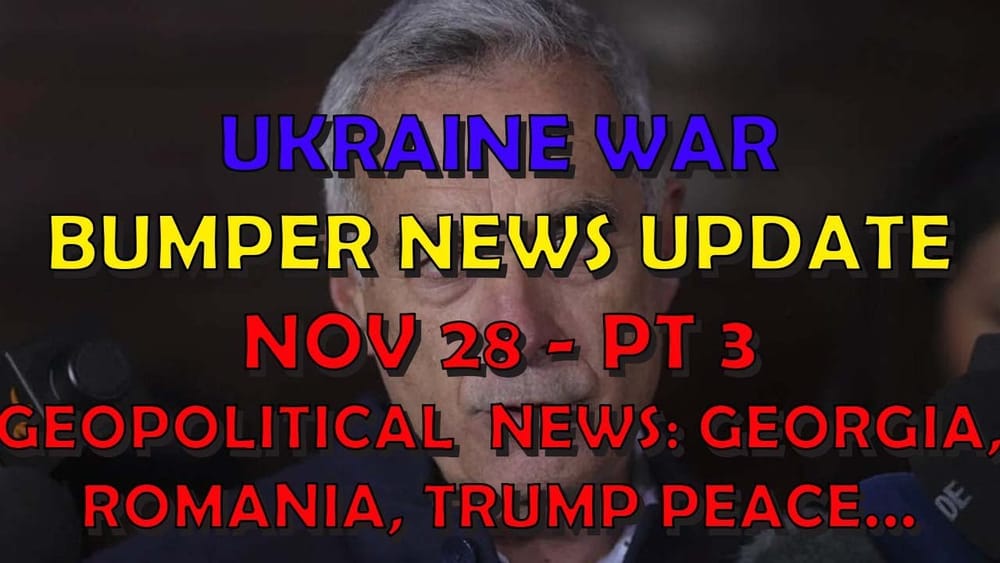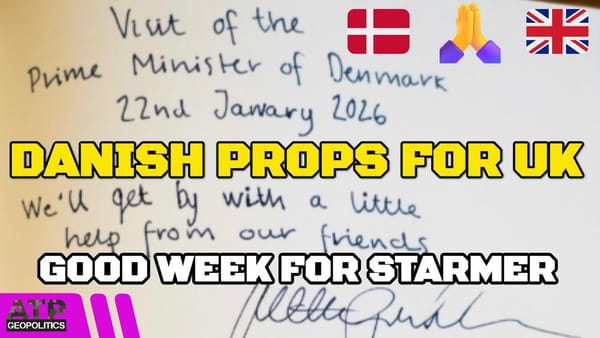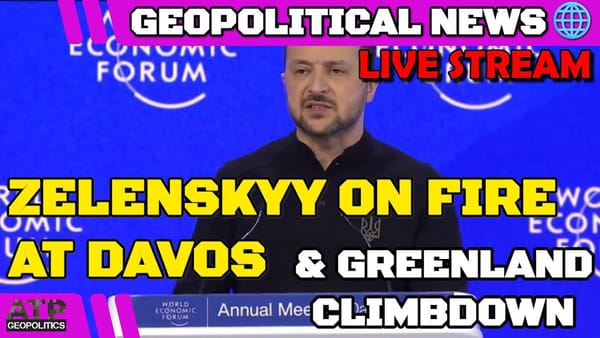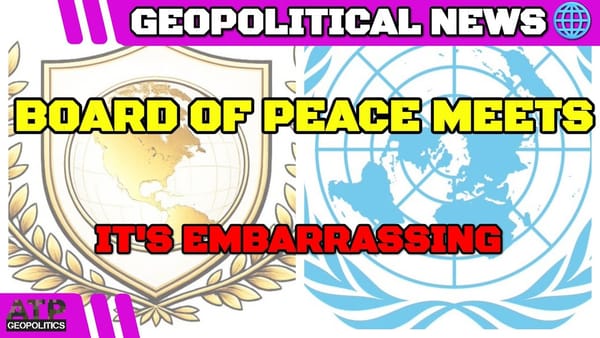Ukraine War Update BUMPER NEWS: Geopolitical News & Analysis
Table of Contents 📖
"Tell me how we're not at war with Russia...our people aren't dying on the front, but everything else, everything else we are doing... and not just us, there's 50 nations to differing degrees to support Ukraine."
Hello Team
🎦 00:00-00:18⏩
Jonathan welcomes viewers to another ATP Geopolitics video and introduces the topic of the video - Ukraine War Update, part 3 for the 28th of November 2024. He mentions that he wants to start by sharing a "wonderful but frustrating and anger-inducing" observation.
Return to top⤴️
Double Standards in Reporting on Ukraine War
🎦 00:18-02:44⏩
Jonathan highlights the stark contrast in media coverage between Ukraine's recent attack on a military site in Bryansk, Russia, using six Atakams missiles and Russia's ongoing large-scale attacks on Ukraine's energy infrastructure.
- He notes the intense media scrutiny and "global panic" surrounding Ukraine's strikes, while Russia's daily assaults, involving 91 missiles and 100 drones, are met with relative indifference.
- Jonathan quotes philosopher Slavoj Žižek who describes the situation as “obscene” and “absurd”.
- He expresses frustration at the normalisation of Russian aggression and the double standards in media coverage.
- Jonathan urges his viewers to challenge these narratives and bring attention to the inconsistencies in how the war is being portrayed.
Protests in Georgia Following EU Accession Delay
🎦 02:44-05:13⏩
Jonathan reports on the protests erupting in Georgia after the government’s decision to postpone EU accession talks until 2028. He explains that the ruling Georgian Dream party came to power on a pro-EU platform but has since backtracked on its promises and allegedly rigged elections.
- The government’s announcement to reject EU budget grants until 2028 has fueled public outrage, leading to demonstrations in the capital city, Tbilisi, and other major cities across the country.
- Jonathan shares updates from social media and local news outlets, highlighting the scale of the protests and the strong public sentiment against the Georgian Dream party, which is perceived as being pro-Russian.
- He expresses hope that the Georgian people will continue their fight against the “Russification” of their country.
Romania: Rise of Pro-Russian Presidential Candidate
🎦 05:13-18:58⏩
Jonathan provides a detailed analysis of the recent presidential elections in Romania, focusing on the unexpected rise of pro-Russian candidate, Kalin Georgescu, who secured the most votes in the first round.
- He delves into Georgescu’s background, his sudden emergence on the political scene, and his reliance on TikTok as a campaign platform.
- Jonathan shares insights from political analysts, noting that Georgescu’s popularity stems from public dissatisfaction with the political establishment and the appeal of his populist rhetoric, which promises quick fixes to complex issues.
- Jonathan then exposes Georgescu’s controversial views, including his pro-Kremlin stance, criticism of NATO and the EU, and embrace of various conspiracy theories. He provides specific examples of Georgescu’s statements, highlighting his pro-Russian bias and his attempts to downplay his extremist views during the campaign.
- Jonathan also discusses the funding irregularities in Georgescu’s campaign, concerns about potential foreign interference, and the demand for a recount of the votes, which could alter the outcome of the election.
- Jonathan expresses concerns about the implications of Georgescu’s potential victory, given Romania’s staunch support for Ukraine. He draws parallels with similar populist successes in other Eastern European countries, highlighting a worrying trend in the region.
US: Trump's Potential Ukraine Policy and Kellogg's Peace Plan
🎦 18:58-25:43⏩
Jonathan shifts focus to the US and discusses potential changes in Ukraine policy under the newly elected President Trump.
- He reports on Trump’s appointment of retired General Keith Kellogg as the U.S. Special Envoy for Ukraine. Jonathan analyses Kellogg’s peace plan, which involves a ceasefire and renewed negotiations between Ukraine and Russia. He expresses reservations about this approach, believing it could benefit Russia and potentially lead to a detrimental outcome for Ukraine.
- Jonathan cites reports from CNN indicating that the Trump administration plans to pressure Ukraine into accepting peace talks by leveraging U.S. aid and potentially delaying NATO membership. He expresses serious concerns about this strategy, highlighting the potential violation of Ukraine’s sovereignty and the potential for a “half-baked” peace deal that favours Russia.
- He points out Trump’s historically ambivalent stance on Ukraine, noting his previous attempts to withhold military aid and his lack of overt support for the country. Jonathan also acknowledges the relative silence from prominent Trump allies, such as Donald Trump Jr. and David Sacks, regarding Ukraine since the election.
- He then discusses Norway’s decision to significantly increase its financial contributions to Ukraine and its commitment to securing military aid logistics. Jonathan suggests that this move could be a preemptive strategy to counter potential reductions in U.S. support.
Europe at War: Richard Dearlove's Assessment
🎦 25:43-29:26⏩
Jonathan discusses the views of Richard Dearlove, former head of MI6, who argues that Europe is effectively at war with Russia.
- Dearlove asserts that Russia perceives itself to be in a state of war with the West, engaging in hybrid warfare tactics beyond Ukraine’s borders, including sabotage and aggressive actions.
- Jonathan agrees with Dearlove’s assessment, arguing that the extensive support provided to Ukraine by Western nations, encompassing financial, military, intelligence, and cyber domains, constitutes a state of war. He rejects the notion that this is merely a “pre-war” situation, as suggested by Polish Prime Minister Donald Tusk, emphasizing the real and present nature of the conflict.
Trump's Peace Plan Options: Analysis from The Economist
🎦 29:26-37:50⏩
Jonathan presents an in-depth analysis of an article from The Economist that explores potential peace plan options for Donald Trump in the Ukraine conflict.
- He outlines various scenarios, including a complete cut-off of U.S. aid to Ukraine, forcing it to accept Russia’s demands, which would likely result in significant territorial concessions and a ban on NATO membership. Jonathan highlights the hawkish stance of some Trump allies, such as Donald Trump Jr., who advocate for withdrawing support for Ukraine.
- He examines the possibility of Trump leveraging U.S. aid to force both sides to the negotiating table, even if Russia presents unrealistic demands, and the potential challenges of enforcing such a deal.
- Jonathan also discusses the potential role of Europe in any peace settlement, expressing concerns that the Trump administration might prioritize a bilateral agreement with Russia, sidelining Ukraine and European allies. He analyses the costs and logistical complexities of deploying European troops to Ukraine as an alternative to NATO membership, noting the potential financial burden on European countries.
- He concludes by emphasizing the importance of avoiding a premature peace deal that benefits Russia and expressing hope that Trump will not “overdo it” in pushing Ukraine towards a settlement detrimental to its interests.
Cyber Warfare and Article 5: Trigger Points and Culpability
🎦 37:50-41:25⏩
Jonathan explores the complexities of cyber warfare and its implications for NATO’s Article 5, which guarantees collective defence.
- He highlights the challenges of defining the threshold at which a cyberattack is considered significant enough to trigger Article 5, comparing it to the philosophical concept of the Sorites paradox, where gradual changes make it difficult to pinpoint a clear boundary. Jonathan argues that, despite the lack of precise definitions, a line must be drawn to determine when a cyberattack constitutes an act of war that warrants a collective response from NATO.
- He also discusses the issue of attributing blame in cyberattacks, noting the difficulty of proving culpability due to plausible deniability tactics often employed in cyber warfare. Jonathan emphasizes that the inherent ambiguity of cyberattacks makes invoking Article 5 even more problematic.
Andrew Perpetua's Speculation on US-Russia Negotiations
🎦 41:25-43:16⏩
Jonathan shares an opinion from Andrew Perpetua, who speculates that recent developments in U.S. aid to Ukraine, including the authorisation of Atakams missile strikes on Russian territory, may be linked to negotiations between the Biden administration and Trump.
- Perpetua believes that Putin’s recent escalation tactics could stem from failed back-channel negotiations with Trump, suggesting that Putin miscalculated his leverage by assuming territorial gains in Ukraine would give him an advantage in international dealings.
- Perpetua also argues that Russia’s current weakness presents an opportunity for other nations to exploit its resources and secure economic benefits, regardless of their stance on the Ukraine conflict, potentially influencing U.S. policy towards Ukraine.
Russia Threatens Japan with Nuclear Retaliation
🎦 43:16-44:15⏩
Jonathan reports on Russia’s threat to use nuclear weapons against Japan in response to its growing military cooperation with the United States. He explains that Russia has issued a warning following reports that the U.S. and Japan are finalizing a joint military plan to deploy HIMARS and other weapons to Japan’s Nansei Islands.
- Jonathan expresses concern over Russia’s increasingly aggressive posturing, now extending its nuclear threats towards Japan.
Syrian Rebels Capture Villages Near Aleppo
🎦 44:15-44:56⏩
Jonathan reports on the capture of several villages near Aleppo, Syria, by Syrian rebels from the Assad regime, which is supported by Russia.
- He points out that the weakening of Assad’s forces could be a consequence of Russia’s preoccupation with the Ukraine war and its diminished capacity to provide support in Syria. Jonathan suggests that this development could lead to further challenges for Russia, potentially losing its strategic foothold in the Mediterranean.
Russia's Debt Crisis and Economic Instability
🎦 44:56-46:35⏩
Jonathan discusses growing signs of Russia’s worsening economic situation, including a mounting debt crisis and looming default risks.
- He references a detailed analysis by “Ceratops” on Blue Sky, which highlights Russia’s struggles with debt management, dwindling foreign currency reserves, and the potential for a sovereign default. Jonathan expresses concerns about Russia’s economic trajectory, noting the compounding effects of a stagnant GDP, high inflation, and the inability to secure external funding.
Putin in Kazakhstan: Ukrainian Flag Hack and Upcoming Peace Summit
🎦 46:35-47:06⏩
Jonathan shares two anecdotes related to Putin’s recent visit to Kazakhstan for a CSTO meeting.
- He recounts an incident where a large electronic billboard was hacked to display the Ukrainian flag during Putin’s arrival, highlighting the ongoing resistance to Russia’s actions.
- He also mentions Andriy Yermak’s announcement that Ukraine is preparing to hold a second peace summit in the near future, indicating a potential willingness to engage in dialogue, although Russia’s participation remains uncertain.
Elon Musk's Clash with Alexander Vindman
🎦 47:06-53:12⏩
Jonathan provides extensive coverage of the recent public clash between Elon Musk and Alexander Vindman, a former U.S. military officer of Ukrainian descent who testified against Trump in his 2019 impeachment hearings.
- He recounts Vindman’s criticisms of Musk’s interactions with Putin and his concerns about Musk’s access to state secrets and his potential role in spreading Russian disinformation.
- Jonathan details Musk’s aggressive response, accusing Vindman of treason and threatening him with retribution, even suggesting the possibility of capital punishment. He highlights the escalation of this dispute, with both sides engaging in heated exchanges on social media.
- Jonathan expresses alarm at Musk’s rhetoric, noting the potential for such inflammatory language to incite violence against former government officials. He emphasizes the dangers posed by Musk’s influential position and his potential to undermine U.S. security.
Musk's Criticism of EU Bureaucrats and Republican Views on the War
🎦 53:12-54:42⏩
Jonathan criticizes Elon Musk for hypocrisy, highlighting a recent instance where Musk condemned unelected EU bureaucrats while failing to recognize his own unelected position of influence within the U.S. government.
- He then presents data from a Pew Research poll that shows a significant decline in concern among Republicans regarding the Russia-Ukraine war, suggesting a link between the spread of disinformation by figures like Musk and shifting public opinion.
Wrap up
🎦 54:42-54:42⏩
Jonathan concludes the video, emphasizing the importance of countering disinformation and urges his viewers to remain vigilant.
Return to top⤴️




